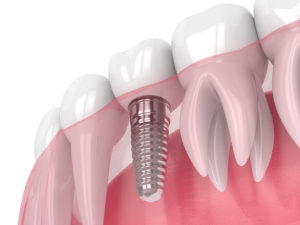 Before dental implants, it was simply not possible to replace the root structures of missing teeth. Other attempts to replicate the roots of teeth in the past were unable to provide the level of function that today’s dental implants can. Beyond replacing the roots of teeth, dental implants can support a variety of prosthetics like crowns, bridges, and dentures to provide lifelike and beautiful tooth replacement.
Before dental implants, it was simply not possible to replace the root structures of missing teeth. Other attempts to replicate the roots of teeth in the past were unable to provide the level of function that today’s dental implants can. Beyond replacing the roots of teeth, dental implants can support a variety of prosthetics like crowns, bridges, and dentures to provide lifelike and beautiful tooth replacement.
Why You Should Replace Lost Teeth with Dental Implants
The effects of losing teeth are more far-reaching than many people realize. When we lose our teeth, our bodies will react. One way that tooth loss affects your oral health is by a process known as “bone resorption”. When the jaw is no longer kept active by the roots of teeth, the bone will begin to deteriorate. This can lead to accelerated aging, uncomfortable prosthetic teeth, and diminished oral function.
Dental implants can help combat bone resorption. When dental implants are placed in the jaw, they will keep bone stimulated so that it doesn’t deteriorate. This can help preserve your appearance, increase the longevity of your replacement teeth, and maintain comfortable oral function.
In addition to the bone-preserving benefits that implants provide, it is important to have replacement teeth that can withstand the forces associated with chewing and biting food. Stable and functional replacement teeth improve the chances of receiving the nutrition you need to thrive.
How to Find Out if Dental Implants are Right for You
While dental implants can help a great deal of people, they aren’t always right for everyone’s situation. The only way to find out if implant dentistry meets your needs is to consult with a provider who places dental implants.
A dental implant consultation will involve receiving a physical examination and diagnostic imaging along with a review of your health history. This process can help you make the best decision for your unique needs and your budget.
If you’re interested in finding out if dental implants are right for you, call the office of Dr. Robert Peak to schedule an appointment with our oral surgeon.





